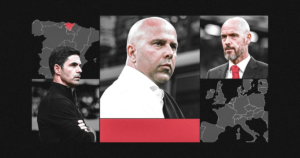Stransfer success is not due to pickle juice, according to a leading sports psychologist. The secret is not to be found in the blow up unicorns England’s players famously took off to recover in the pool. Or the £3,400 electric bikes they pedaled to boost their recovery after the game. It’s not even about the driver.
“Instead, what I’m about to say will horrify you,” says Michael Caulfield, who has worked in professional sports for more than 25 years. “Football is – or should be – only about joy.”
Joy was what England fans wanted so badly in their game against Slovenia this week. After the toil of the team’s opening Euro 2024 games against Serbia and Denmark left fans craving quality.
But what they got was another show mired in fear and anxiety. And another draw.
Caulfield, who has worked with Gareth Southgate in the past, says: “We are now obsessed with the next quick fix – and I include the massive cult of the manager. Next to pickle juice.
“The brutal truth is that players only learn from other players. You can bring in the reincarnation of Sigmund Freud and Barack Obama to motivate the team – and Ed Sheeran to play guitar for them afterwards – but the only thing that will make a difference is learning from each other and helping each other.”
And what do the players (ideally speaking) learn from each other? The joy each of them felt as children when football was their obsession.
“The players need to get back to their 10-year-old selves because what has been forgotten in this age of professionalism is that football is not a perfect game,” Caulfield said. “It’s a simple game. This is a game of utter mayhem. It’s the most random game of all.”
He pointed to a game last Wednesday where Georgia won 2-0 against Portugal. It, he said, was a joyous game: when Georgia scored a goal, the team rushed back onto the field, just like soccer-mad kids in the back streets, oblivious to anything but the ball.
The core problem, as Julian Nagelsmann, the manager of Germany’s national team, said, is that a player can only be improved so much.
At the level of tournament football, it’s no longer about formations and systems, false nines, low blocks, pressure, sixes and fours, and eights and tens, and pockets of space – it’s about managing the player as a person.
Only 30% of Nagelsmann’s work, he said, is about football and tactics. The other 70% is about managing the player.
Sports performance consultant Andy Barton agreed. “What we want is happy football,” he said. “If you are happy, the synapses in your brain work faster and you can make calculations faster.
“There seems to be quite a big fear of failure in the way England played and the way to deal with that is to make failure acceptable.”
That’s not to say that losing is right, he hastened to add, but it’s about giving players the freedom to try things out: to play without fear.
“Taking players’ minds off winning or losing, and focusing instead on the things they are in control of – the process – means they can get into a state of flow,” he said.
That means players don’t worry about failure because they don’t think about the consequences, he explained: they only think about the action in the moment.
“You want players in this condition even when they are right in front of the goal,” he added. “They must not think about whether the ball is going to be a goal – they must be so present that their only thought is to take the shot. If they don’t think about what happens after that, what happens after that will take care of itself.”
So what can England’s frustrated, disappointed fans learn from sports psychology?
Dr Sandy Wolfson is one of the most prominent sports and exercise psychologists in the UK. A chartered member of the British Psychological Society, she has a specialist interest in football – and is a passionate Newcastle supporter.
She believes that sports psychology has a lot to teach everyone. “I’m a hopeless fan myself, so I know that we become so intertwined that it’s very hard to stay positive when your team isn’t doing well,” she said.
For both players and fans to stay positive in the wake of soccer disappointment, she said, they must turn to rituals.
“Players and fans can achieve catharsis and solace by getting into the habit of analyzing the game with other fans,” she said. “They need to look for aspects of the game that weren’t so bad when viewed from a neutral perspective. They need to look at previous games where the team did well and then focus on the future – look forward to the next game or, if it was really bad, the next event.”
Barton is already looking forward. “I suspect the English team will be liberated in their game on Sunday by the fact that it is all or nothing,” he said. “I have the feeling that they will feel more freedom – and thus more happiness and flow. I could be wrong – but I have hope.”
Five top tips for success from sports psychologists
-
Take your mind off the consequences of your action and focus on the action. Anxiety, fear, stress are projections of the future: concentrate on the present.
-
Learn how to change your perceived reality. Premier League footballers learn to shut out fans if they feel oppressed by them. For example, it can help people who don’t like public speaking, who may see their audience as more intimidating than they actually are.
-
Find a ritual to recover from disappointment that creates positivity.
-
Learn from those you admire. Stay close to them and be forgiving of their mistakes and failures.
-
Don’t have top tips, Caulfield said, because by tomorrow someone else will have come up with five other tips and “you’ll be completely confused”. “A good grandparent is better than any tip,” he said. “Turn to gray hair, because chances are they’ve been through a bit. They are not right or wrong, but they will ask the right questions and help you sort things out.”





